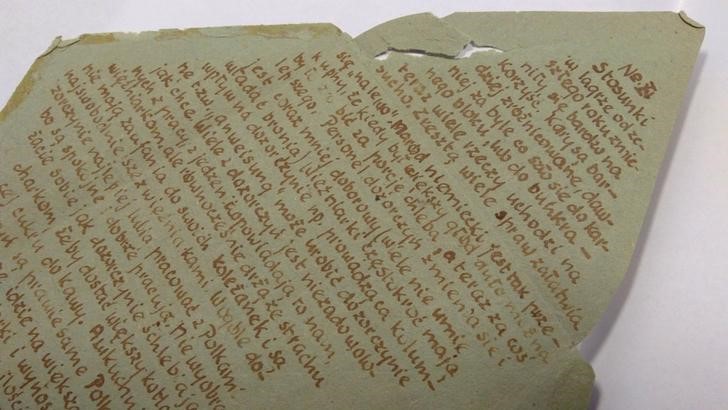
LUBLIN, Poland (Reuters) – Some 27 letters written in urine by Polish women inmates to report on gruesome medical experiments performed on them by Nazi concentration camp doctors have been given to a small museum in Poland to be preserved.
The letters, which informed the world about the deadly experiments made on 74 women at the Ravensbrueck camp in 1943-1944, were apparently normal notes to families but with invisible messages between the lines and in the margins.
Donated by the family of Krystyna Czyz-Wilgat, who wrote several of them, some letters are in poor condition and it is not clear if the “Under the Clock” Martyr Museum in Lublin, in eastern Poland, will put them on public display.
The messages, which had to get past censors, were written with a thin wooden stick. Due to an acid reaction with the paper, the urine soon lost its colour and became invisible. To read the hidden message, recipients had to heat up the letters.
A letter with urine encryption from the women’s concentration camp in Ravensbrueck, written by one of the prisoners, is presented at the Martyr Museum in Lublin, Poland, February 17, 2017. REUTERS/RobertIn the first letter the women sent was a clue that following letters would have secret messages written in urine.
Thanks to the secret messages, the list of 74 women subjected to the medical experiments – such as being injected with gangrene to test new drugs – eventually became public knowledge.
“Even though there were broad reports about the Auschwitz camp, on Ravensbrueck there was little information released,” said Barbara Oratowska, curator of the Lublin museum.
“And only those female Poles were the ones who conveyed this information. That is why these letters are such valuable material and historic evidence.”
Thanks to the letters, the experiments in Ravensbrueck were known abroad before the end of the war in 1945.
A letter with urine encryption from the women’s concentration camp in Ravensbrueck, written by one of the prisoners, is presented at the Martyr Museum in Lublin, Poland, February 17, 2017. Picture taken on February 17, 2017. REUTERS/Robert FurmanczukAfter Germany’s defeat, 20 doctors from several camps were tried as war criminals by a United States military court in the first of the postwar Nuremberg trials. Seven received death sentences and seven others got long prison sentences.
Between 1939 and 1945, about 130,000 women prisoners passed through the Ravensbrueck camp, which was about 50 miles (80 km) north of Berlin. A third of them were Polish.
(Reporting by Robert Furmanczuk; Writing by Lidia Kelly; Editing by Tom Heneghan)
Copyright 2017 Thomson Reuters. Click for Restrictions.


